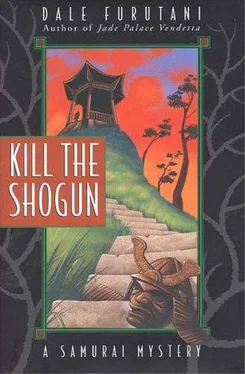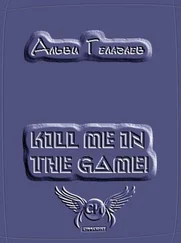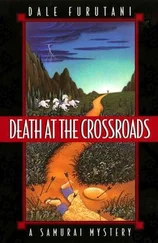Dale Furutani - Kill the Shogun
Здесь есть возможность читать онлайн «Dale Furutani - Kill the Shogun» весь текст электронной книги совершенно бесплатно (целиком полную версию без сокращений). В некоторых случаях можно слушать аудио, скачать через торрент в формате fb2 и присутствует краткое содержание. Год выпуска: 2011, ISBN: 2011, Жанр: Исторический детектив, на английском языке. Описание произведения, (предисловие) а так же отзывы посетителей доступны на портале библиотеки ЛибКат.
- Название:Kill the Shogun
- Автор:
- Жанр:
- Год:2011
- ISBN:0688158196
- Рейтинг книги:3 / 5. Голосов: 1
-
Избранное:Добавить в избранное
- Отзывы:
-
Ваша оценка:
- 60
- 1
- 2
- 3
- 4
- 5
Kill the Shogun: краткое содержание, описание и аннотация
Предлагаем к чтению аннотацию, описание, краткое содержание или предисловие (зависит от того, что написал сам автор книги «Kill the Shogun»). Если вы не нашли необходимую информацию о книге — напишите в комментариях, мы постараемся отыскать её.
Kill the Shogun — читать онлайн бесплатно полную книгу (весь текст) целиком
Ниже представлен текст книги, разбитый по страницам. Система сохранения места последней прочитанной страницы, позволяет с удобством читать онлайн бесплатно книгу «Kill the Shogun», без необходимости каждый раз заново искать на чём Вы остановились. Поставьте закладку, и сможете в любой момент перейти на страницу, на которой закончили чтение.
Интервал:
Закладка:
Dale Furutani
Kill the Shogun
CHAPTER 1
Delicate feathers,
speed, grace, style, and elegance.
Death in an instant.
Japan, the year of the Rabbit, 1603
She looked for something to kill. When she was taken from hooded darkness, it was because something was supposed to die. Her sharp eyes scanned the sky, looking for movement or a patch of dark against either the blue sky or the billowing white and gray clouds.
It was the month of No Gods, and soon it would be the month of White Frost, so the day was not hot. Still, even on a cool day, the sun heated up patches of rock and earth, forming weak thermals that made invisible pillars in the air. Her delicate feathers sought these thermals like sensitive instruments, instinct telling her to use the columns of rising air to loiter in the sky as she sought out her prey. She encountered the buffeting of rising air and banked her wings to spiral into the thermal, constantly sweeping the sky with her bright eyes.
She gave two flaps of her powerful wings, the column of air not being strong enough on a cool day to keep her aloft without effort. Below, the steep hills were densely covered with trees. The fall colors were just beginning to tinge the landscape like the delicate strokes of a kimono painter, touching brush to silk and watching the rich hues spread across the tightly woven, shimmering cloth.
A movement invaded the periphery of one eye and the majestic bird cocked its head to track it. A dove, flying across the treetops. The hawk curled its wing feathers and made a tight bank. With a few beats of its wings, the hunter increased its speed to catch up to the hunted.
The dove was still unaware that mortality was approaching. It was intent on reaching the rice paddies on the horizon, where its own prey, grubs and worms, would be in abundance. The hawk increased its speed as it trimmed back its wings to plummet down on the dove.
At the last moment, the dove heard the rustle of wind in wings, then the needle-sharp talons of the hawk punctured its body.
With a few slow beats of its wings, the hawk rose higher into the sky, still clutching its dying prey. It made a wide semicircle until it spotted the group of men on horseback, and it started making its way back. One of the men held up a leather-covered arm to the bird, inviting it to return to the perch where it would get a tasty morsel to reward it for its successful hunt.
As the hawk approached the hunting party, its sharp eyes noticed another group of men. This group was hiding in the rocks near the men on horseback. Like the hawk, they were also hunters seeking their prey.
The two men had cloths tied around their heads, covering the bottom of their faces. One slowly raised his head above the rocks so he could get a clear view of the hunting party. The man next to him also rose and held out three fingers with his hand. Then he pointed to the right.
The first man counted three figures from the right and stared intently at the face of his intended victim. Even at this distance, it was easy to make out the features of the man he would eventually kill. He found it interesting that this man, secure in his power and lofty position, was actually a dead man. He simply didn’t know it yet.
Tokugawa Ieyasu, the newly named Shogun and ruler of all Japan, felt the familiar weight of the hawk settle on his arm. He cooed at the bird and gently stroked its head with one finger. A servant went to pick up the dead dove where the hawk had dropped it and ran over to show it to the Shogun. Ieyasu nodded and turned his attention back to the hawk. He was pleased with the efficiency of the bird’s kill. Ieyasu was a man who valued efficiency.
The servant took out a knife and cut a strip of flesh from the dove’s body. He handed it to Ieyasu.
“Here, my pretty one,” Ieyasu said, feeding the piece of meat to the hawk. “See, Honda, how she enjoys the treat! She is an extremely intelligent hawk.”
Honda, renowned for his gruffness, growled, “If the bird were smart, it would keep the entire kill for itself.”
Ieyasu looked at his other companion and said, “What do you think, Nakamura-san? Is it proper that the bird only gets a portion of that which she killed? Is she a dumb beast for not flying away and taking it all?”
“No, my Lord, it is not improper. Takagari , hawk hunting, goes back to the Emperor Nintoku, over twelve hundred years ago. It is a noble sport and one that follows natural principles. Everyone can see that there is a hierarchy in nature, so it is reasonable that this bird should have a master, just as men do. You are this hawk’s master. You have worked with her and trained her to do your bidding. Each time you hunt with her, you stand the chance of losing her. But you have not lost her. She accepts that you are her master. She has returned to you and is quite content to eat whatever you choose to give her. It was her choice not to seek freedom and the ability to eat the entire dove.”
“For goodness’ sake, Nakamura, you make everything sound like a lesson from a priest. It’s a dumb beast. You make it sound like a vassal!” Honda snapped.
“Well,” Nakamura said, “in a way it is a vassal. It tenders its services to Ieyasu-sama and in return it’s very happy to accept any rewards the Shogun chooses to give it. So it is with the men who fight for Ieyasu-sama.”
“I fight because I am a Mikawa bushi , a warrior of Mikawa!” Honda shouted. “Next you’ll be claiming that this beast understands bushido !”
Totally unconcerned about Honda’s rising anger and red face, Nakamura said, “Well, you bring up an interesting point. I wonder if there is such a thing as bird bushido? Maybe we should make a study of it?”
Before Honda exploded, Ieyasu stepped in. “Next you’ll be talking about rabbit judges and badger physicians,” he said. “While it’s true that animals can have many human traits, you go too far when you say that animals have a sense of bushido, Nakamura-san.”
Nakamura dipped his head and said, “I’m sorry, Ieyasu-sama. You must excuse the ramblings of a man who now has too much time on his hands.”
Ieyasu was used to keeping his own counsel and masking his thoughts from appearing on his face. Despite the rebuke he had just given Nakamura, he was quite amused by the notion of bird bushido. But Honda was taking Nakamura’s musings much too seriously, and it was easier to rebuke the scholarly Nakamura than it was to calm the volatile Honda.
In his response, however, Ieyasu noted that Nakamura had returned a subtle rebuke of his own. Nakamura was scholarly but also ambitious. He wanted a larger role in the new order for Japan that Ieyasu was creating, and claiming he had too much time on his hands was his way of calling this to the Shogun’s attention. Ieyasu was glad that understanding such a subtle response was beyond Honda’s abilities, or perhaps there would be a clash between these two vassals that would extend beyond words. Taming men was sometimes like taming hawks. Although Nakamura was scholarly, he was also brave, and Ieyasu had seen him in the heat of battle, calmly discussing Chinese poetry, stopping only to give orders to his troops.
Honda, on the other hand, was of the old school of warrior. A rough country bushi who was given to earthy humor and bursts of temper. Subtlety was beyond him. Honda had been with Ieyasu from the beginning, when the young Tokugawa had recovered his fief of Mikawa and labored to restore his clan to a point of respectability. It had taken decades, and many battles, but now the Tokugawas were preeminent in Japan and anyone who could claim to be a Mikawa bushi, a warrior from Ieyasu’s original fief of Mikawa, did so proudly.
Читать дальшеИнтервал:
Закладка:
Похожие книги на «Kill the Shogun»
Представляем Вашему вниманию похожие книги на «Kill the Shogun» списком для выбора. Мы отобрали схожую по названию и смыслу литературу в надежде предоставить читателям больше вариантов отыскать новые, интересные, ещё непрочитанные произведения.
Обсуждение, отзывы о книге «Kill the Shogun» и просто собственные мнения читателей. Оставьте ваши комментарии, напишите, что Вы думаете о произведении, его смысле или главных героях. Укажите что конкретно понравилось, а что нет, и почему Вы так считаете.












